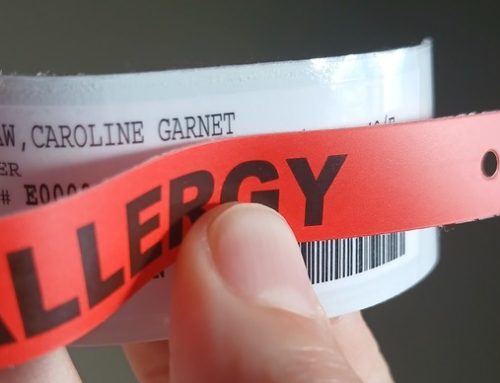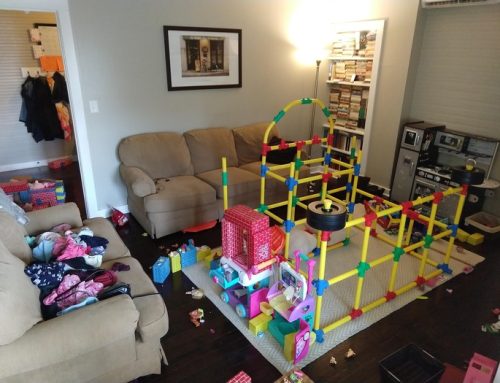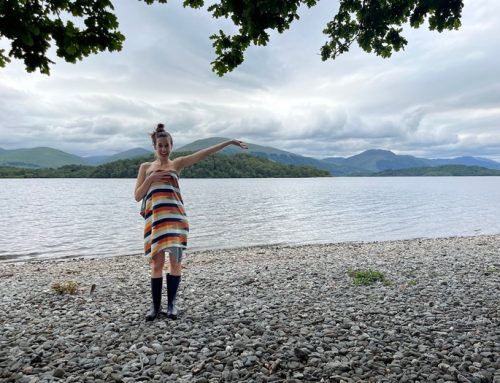Once upon a time, a beloved friend had a pattern that drove me crazy. She’d enter into high-stress situations: working a demanding job while planning a wedding, coordinating a cross-country move with small children, or traveling with her family in a space with zero privacy.
She’d confess to feeling overwhelmed and unhappy. Then she’d say, “It’s OK, because once [this current insanity] is over, I’ll be so happy!”
Alas, that never turned out to be true. She’d dive right into the next high-stress scenario, repeating the same pattern and delaying her happiness to the future. The psychological term for this pattern is the “arrival fallacy.”

Arrival fallacy definition
The arrival fallacy is the idea that once you accomplish this or that goal — once you “arrive” at a certain level of achievement and success — then you will be happy.
This is a common limiting belief for recovering perfectionists, though we might not recognize it as such. Here’s how it shows up in everyday language …
- If I just get through X, then everything will be better!
- When I check Y off my list, then I will totally calm down.
- When Z is over, then I will get my life back.
Can you relate? If so, please know that you are not alone. Particularly in hard times, it’s tempting to pin all of our hopes on the future. To effectively press pause on personal responsibility right now.
That said, it’s also a dangerous game. If you decide that external circumstances must change in order for you to feel better, then you effectively make yourself a victim of those circumstances.
And in the process, you lose time that you can never get back.
Who coined the term arrival fallacy?
It was supposed to be Tal Ben-Shahar’s crowning moment. He’d worked so hard to become the champion of his sport. And eventually, his dreams came true: he won the U.S. Intercollegiate and Israeli National squash championships.
But when Tal Ben-Shahar won those elite competitions, he was surprised to discover that he wasn’t happy. Here he’d been striving for success for so long, but perfectionism prevented him from actually enjoying the moment.
Back then, he was a classic insecure overachiever; he thought that the big wins would bring him peace within himself. When that didn’t happen, Tal changed course. He decided to learn all he could about happiness.
Along the way, we became a psychologist, international best-selling author, and Harvard University professor. He created two of the largest classes in Harvard University’s history.
Dr. Tal Ben-Shahar coined the term “arrival fallacy,” introducing it in his bestselling book Happier. The term was inspired by how he felt at those squash championships. He thought that winning would make him much happier than it actually did.
To quote the expert himself, “Arrival fallacy is this illusion that once we make it, once we attain our goal or reach our destination, we will reach lasting happiness.”
I had the honor of interviewing Dr. Tal Ben-Shahar back in 2020, as part of the Pursue Your Path interview series I hosted. If you’re ready to stop draining yourself in the pursuit of perfectionism (and start enjoying your life), you’ll love this inspiring interview.
In our interview, Dr. Tal and I talked about …
- The three fears that comprise perfectionism – and the antidote to each one
- Why you don’t have to worry that being grateful for what you have will take away your drive
- The difference between perfectionists and optimalists – and why the optimalist will always come out ahead
- The key practices you can integrate in order to shift away from perfectionism and into optimalism
What is the difference between the arrival fallacy and the hedonic treadmill?
As you now know, the arrival fallacy is the belief that once you achieve a certain milestone, then you’ll be happy. In this framework, happiness is always around the next corner, elusive and always out of reach.
The hedonic treadmill (or hedonic adaptation) refers to the human tendency to return to a baseline level of happiness, even after significant positive or negative events occur.
Hedonic adaptation overlaps with the arrival fallacy, yet it’s also a distinct concept in its own right. Let me give you a few examples of hedonic adaptation, so you’ll see what it looks like in real time.
First, repeated studies of lottery winners show that within about a year of receiving their winnings, they’ve returned to their prior baseline level of happiness. They have an initial spike in happiness, but over time, their happiness levels off to the former baseline.
By the same token, studies of people who suffer disabling accidents that decrease their mobility also take about a year to adjust to their new reality and — you guessed it — return to their prior baseline level of happiness.
Simply put, our systems adapt. For better or for worse, we tend to adapt and return to our “known” level of happiness.
How do we change that baseline level? How much can we change it? That’s hotly debated, but one thing we do know is that all efforts to begin shifting our status quo need to start in the here and now … not in some indefinite future time.
I like how a coaching client once described her experience of both hedonic adaptation and the arrival fallacy:
“All of these nice new things [I want] —the new planner, a shiny beachfront room, days off, etc—they seem to advertise happiness. ‘Get this, and you’ll finally be happy.’ But … if I never build the muscle to be happy with what I have, why the hell would I be happy once I’m at the fancy hotel room or wherever? Then I’ll be kicking my happiness down the line to the next thing I can buy later.”
How to get over arrival fallacy?
Practical Strategy #1: Look at how you expect you will feel when you “arrive” at a given destination.
Notice that what you actually desire is the feeling state that you believe will accompany the “arrival.” Also notice that we yearn for just a small handful of feeling states: love, joy, peace, and freedom.
According to Spiritual Psychology (and many other spiritual and religious traditions), we yearn for these states because they are our home. They’re where we come from, and where we are going. At the deepest level, love, joy, peace, and freedom is who we truly are.
All of that to say: ask yourself which of these states you yearn to feel once you accomplish something significant. Then ask yourself …
What would feel like peace right now?
What would feel like joy right now?
What would feel like freedom right now?
What would feel like love right now?
Give yourself the gift of feeling the way you want to feel right now, not just at some future point.
There’s an interesting benefit to this: first and most obviously, you’ll feel better in the moment. But secondly, you will also increase your likelihood of attaining the goal you thought you needed in order to be happy!
Let me explain: we tend to think that getting to a certain milestone will then make us feel freer and happier. When actually, if we start with feeling freer and happier, we are actually more likely to achieve (or perhaps more accurately, receive) that milestone!
Martha Beck describes it beautifully in her podcast episode, Rest, Remember, Rise:
As I’ve often said, the one thing I can tell people to repeat that makes them feel most like they’re telling the truth is the sentence, “I am meant to live in peace.”
…. If you can find yourself in peace, here’s the deal. Everything you have ever asked for is sent to you from these loving beings, but they always send it to your real address, and you are meant to live in peace.
So if you go into peace, [these loving beings] are able to deliver to you the things that you have asked for.”
Practical Strategy #2: Look more closely at your personal relationships.
Our culture teaches us to prioritize personal achievement over personal relationships, but if you’d like to have more happiness in your life, the research is actually pretty clear on what to do next.
According to the Harvard Study of Adult Development – which, as of this writing, is one of the most substantial studies on happiness that we have – having close, loving relationships is the strongest predictor of happiness over the long term.
To quote the Harvard Gazette article on the study:
“Close relationships, more than money or fame, are what keep people happy throughout their lives …. Those ties protect people from life’s discontents, help to delay mental and physical decline, and are better predictors of long and happy lives than social class, IQ, or even genes.”
This includes your relationship with yourself, by the way. If you don’t have a good relationship with yourself, that can erode the foundation of your other relationships. You’re the common denominator!
Practical Strategy #3: Begin making changes to free up your life now, rather than putting it off “until things settle down.”
Yes, it’s true that we do need to challenge ourselves often in order to grow. But for some of us, our challenge isn’t to work harder. Our challenge is to tell the truth and do less. To say, “This is too much.” To ask for help, or change plans, or advocate for our needs.
We already know how to “beat the donkey” and overwork. We already know how to push ourselves, hoping that if we just do this one more thing, we’ll find the peace we’ve been pursuing.
But peace isn’t around the next corner. Peace is here and now.
Again, the temptation is to say, “Oh, when ABC is done, then my life will get easier.” To simply wait until a certain commitment ends, and then resolve not to add more after. Speaking from experience here: let me encourage you not to do that. Take steps to lighten your schedule now.
To quote Oliver Burkeman in his fantastic book Meditations for Mortals: “Free up time by renegotiating existing commitments, not just planning to make fewer.” He talks about how planning to make fewer almost never works, whereas what does work is …
“… biting the bullet and renegotiating some of the commitments that are already on your plate: backing out of projects, requesting deadline extensions, or canceling social plans, so as to reduce the real, current demands on your time, not just hypothetical demands on it later.”
Want a step by step process to free up your time, starting right now? Enter your email address below to receive the Sacred Circle Exercise.
Free Up Time to Pursue Your Purpose with the Sacred Circle exercise!
The Big Aha Moment
Remember how I shared with you at the beginning that it used to drive me crazy when my friend would give voice to the arrival fallacy? While I’d usually nod or make sympathetic noises, deep down I wanted to respond by shouting:
“Listen! You’ve been saying things like this for years! But your life will not, in fact, magically calm down in a couple of months. That’s not how it goes!
You’ll find a way to start a new project or say yes to something else that will lead to another season of chaos. Then six months from now you’re going to tell me the same story, and I don’t want to hear it anymore!
The words are empty! Unless you change, none of this is going to change, either. It’s not about the stuff “out there.” It’s about this need you have to prove that you can handle all of the craziness, that you can overachieve your way out of it.
And even though you’re exhausted right now, unless you take ownership and grab the wheel, you are going to set yourself up to do the whole darn thing again. Please, don’t do that. Please make different choices this time.”
As you can see, I had some Big Feelings about this pattern. And one day it dawned on me that the person I was really talking to with that internal rant was myself.
I felt furious that my friend kept getting into these super-demanding scenarios with little to no support … but I wasn’t looking in the mirror. Her pattern got on my nerves precisely because I did the same thing!
The truth is, I wanted me to stop blaming my circumstances and start looking inward. I wanted me to pay attention to my patterns of overwork. I wanted me to create a feeling of spaciousness, rather than stress.
The Big Feelings were never about my friend, not really. That was just me, trying to bring myself to my own attention.
Unhooking from the Lie of Later
So now, it’s your turn to look inward. Where have you been putting off your real life until some unspecified “later”? What goal have you been telling yourself you can’t start working toward today?
Or maybe for you it’s not about doing more; maybe it’s about doing less. What needs have you forgone, even though your spirit begs for them? (Is it sleep, or silence, or the simple pleasure of having more space to transition from one thing to the next?)
Either way, give yourself some of what you need today. Even if it’s just 5 minutes, or perhaps an hour a week. Trade one thing you hate for one thing you love. It all counts. It all adds up.
As a case in point: I wrote the first version of this post just after a snowstorm. My work plans for the week were upended; I spent much of the time with our then-19 month old firstborn, who thought that putting my underwear on her head was a great use of time.
Even so, I found that I could still write as long as I was willing to chip away at it. A few minutes here, a few minutes there. Sure, there was a part of me that argued that I didn’t have time to write this post at all.
This part argued that I should just wait until the following week, when we’d have more childcare and writing would feel “better.” Fortunately, I know that’s the arrival fallacy talking. The truth is, there is no better time to do what I love than right now.
I’m done putting off what matters to me until later. Life is now. It’s only ever been now.
Will you join me? If so, you’ll discover that, just as every single flake of snow and drop of sleet adds up to a snowstorm, you can make a blizzard of beauty in your life, one small choice at a time.




My current “lie of later” — When I retire, my life will be wonderful. Until I retire, my life will NOT be wonderful.
Clearly, I have some work to do on my thinking.
PS. Love your new website design — it’s beautiful!
E, great job identifying that “lie of later”! While I hope your retirement will be wonderful, you can also ask yourself: How can I create a wonderful life now?
And thank you for your kind words r.e. the new website design as well. 🙂
Lie of later. Everything is a lie of later when you live by a list of things to that does not include taking care of self. One thing is predicated on accomplishing the previous thing, the next thing can’t be started until the last thing is completed. All things are important and are must do things.
But are they really? Did you get them done yesterday? If so, congratulations, I did not. Did I wake up today to calamity because they were not done? No. When I’ve done this a few hundred or a few thousand times, and when I listen to smart people like Caroline giving hope and encouragement, I finally realize not ALL things are important, or at least not important enough to stress over and create more burden to ourselves.
There’s a saying that all things will come in their time. I’m at the point in my life that if they come, they’re important. If they don’t, then they’re not. Realizing this frees me to take time for ME. Caroline has repeatedly told me (us) to put 15 minutes of nothing into our daily routine. When doing that, a lot of “must-do-today” items fall away. What’s left are things meaningful to us in that point in time. And by not having back-to-back to back must-do tasks, I may get more done because I’ve chosen which I want to do, or maybe dump those and do something that pops up.
So, for me, today, the things “I can’t do later because” have been set aside to read more of You Don’t Owe Anyone. I am now free to do what’s next on a new list of discreet things that really wasn’t built on anything being done before it except in my than my time prioritization.
Ted, what a great insight here! I love your point that when we spend time in stillness, doing nothing, a lot of the false urgency we feel falls away. And what’s left is a calmer recognition of what truly matters here and now, in this moment.
And I’m honored that you decided to spend some of your valuable time today reading You Don’t Owe Anyone!
What great questions! I am guilty of “getting things done” before I allow myself to enjoy. The problem is that everything is never done! So, an enjoyment break is helpful for focus and energy to do the things I must do. This post is a great reminder, phrased differently, to make me see my tendency yet again, how I derail myself.
Love your book and website.
Always amazed how I see myself in your writings. Your honest transparency is so helpful.
Dinalynn, I’m so glad that you can see yourself here, and that you’re gleaning so much goodness.
Another great book that has shaped my thinking about allowing myself to enjoy is Wayne Muller’s A Life of Being, Having, and Doing Enough. Enjoy!
I remember the very first video in the Pursue Your Path Series with Tal and how the ‘arrival fallacy’ shook me to the core! (And also pulled me right in to watch the whole series, time very well spent)
And since that beautiful warm day last July I have been resisting the fallacy. It was/is often – ‘I will feel happier if I lose some weight, I will feel happier if I wait in this job I don’t love and see what comes, I will be happier once this pandemic is over… ‘ And so on. Bit by bit I have and continue to work on these, I am not the wrong size, my clothes are! I left my job without a new one to go to, I surrendered to the universe and a new job found me which I love (it is still challenging though!)
Anyway, after a bit of a ramble the point is – I agree wholeheartedly with you!
Sending much gratitude to you from over the ocean and am looking forward to the book.
Also – love the new website 🙂
Ellie, I love that you remember that first Pursue Your Path Series video, and that our conversation about the arrival fallacy resonated for you! And I’m delighted to hear of the changes you’ve made in your life since then: new clothes, new job, and new attitude. 😉 Thank you for your kind words about the new website too!
An arrival fallacy that has been guiding me for far too long is that “I don’t have time to read emails like this one- emails that greatly interest me, but require thinking. Thinking = time. I’m busted. I do have more to do than I can fit into today. However, your operative word “some”, (do some of what is important to me) makes all the difference in the world. Thank you for sharing your personal experiences. They hit their target.
Janie, I love that you zeroed in on the word “some”. Rather than the all-or-nothing thinking I wrote about last week, we can give ourselves permission for SOME … some reading time, some resting time, some of whatever fills us up.
Thank you for reading, and for letting me know that this post was on-target for you!
This resonates so much to me! I’m going to move from the city to the countryside in the next months, and I’m dreaming of my future life with children and pets and all the nature around and the silence but then I think that if I’m struggling with my life moving far away it’s not like having a magic wand that makes me feel better, I need to continue to work hard on myself and going to therapy to change my life!
Stefania, I’m glad to hear that this post came at a good time for you – congratulations on your upcoming move! It’s such a tricky paradox, because on one hand, we can make changes that contribute to (or detract from) our happiness. Yet on the other hand, we tend to bring our discontent with us from place to place unless we work with the root cause. It sounds like you ARE working on the root cause, for which I applaud you. Keep going!
The question is a tough one for me to answer right now, because I am awaiting the “truth of arrival.” I have had six surgeries in 18 months; 4 were major; the last two were spine surgeries within a month of each other. Add in covid, and my life, my dreams & goals, must be on pause.
I understand the concept of the arrival fallacy. I heartily agree with what you’ve written today. The question you pose is excellent motivation. I simply wish to give voice to those of us who truly have no choice but to press “pause.” To rest, to heal in some way, to regroup, and to trust the process. A metaphor about music comes to mind about the pauses being as important as the notes in creating a beautiful song.
Diane, my heart goes out to you – you have been through so much over the last two years. And I wholeheartedly agree, there are necessary times of pause for all of us, times to do less, rest, and heal. Your comment reminds me that there is beauty in trusting that process – that the choice to trust the process can be, in itself, a way of creating beauty.
“One small choice at a time”. This is my favorite line. I have been shifting myself to do what I really live and ignore most of the chaos around me. There is so much I want to do. I make excuses or hide in my obsessive compulsive cleaning or even over helping my children that are old enough to do things on their own. I need to day no more instead of saying yes to everything and experiencing burn out. It’s avoidance for sure. I used to be so creative a d fun. I’d like to get back to those moments. Those moments that will make me shine. I too am a writer. I’ve taken babysteps and committed to my writing again.
Oh, Carly, I hear you! Good for you for noticing where you hide (in cleaning and hovering with your kids), and where you’d like to redirect that creative energy instead, in your writing. Know that I am cheering you on as you make those small choices.